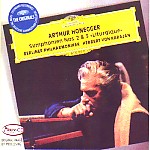Although Herbert von Karajan probably would have wanted to be remembered as a great conductor in the central German repertoire, his best orchestral recordings often were in pieces that stood outside of his “Fach”. This Honegger disc is certainly one of them. It seems like only yesterday that DG reissued it in its “Originals” series, but now thanks to Arkivmusic.com’s on-demand program with Universal it hopefully will be available forever.
The Second Symphony, for strings and trumpet, features simply astounding playing from the Berlin Philharmonic, with an impact and sonority that the orchestra certainly can’t equal today. The “Liturgique” also has an uncommon degree of bite and excitement; there’s none of that excessive smoothness that made Karajan sometimes sound like the “snake oil salesman of music”. Stravinsky’s Concerto in D probably is his coldest, most sterile creation (leaving aside some of the very late pieces), and this gracefully immaculate performance suits its “pure” aesthetic to perfection. Very good sonics, again better than Karajan often got from the yellow label, complement one of his very finest efforts.
































